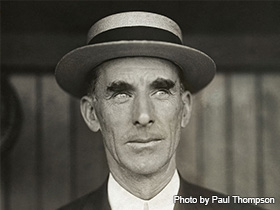Baseball; Connie Mack; Hall of Fame; Major League Baseball (MLB); Philadelphia Athletics; "The Tall Tactician;" White elephant; World Series
Cornelius Alexander McGillicuddy (Connie Mack) was born in East Brookfield, Massachusetts, on December 22, 1862. He was the third of seven children to his Irish immigrant parents. He began a short career as a professional baseball player but quickly turned to coaching, which better suited his knowledge of the game. He holds the records for career wins, loses, and games managed as the skipper for Philadelphia Athletics. He was enshrined in the National Baseball Hall of Fame in 1937. Mack was buried in Philadelphia, Pennsylvania, on February 8, 1956.
Cornelius Alexander McGillicuddy was born on December 22, 1862, in the little-known town of East Brookfield, Massachusetts. He went by the name Connie Mack, along with another nickname, "The Tall Tactician." His parents were Irish immigrants who had seven children. Mack was the third oldest of his siblings. Like many young boys in his time, Mack enjoyed playing America's favorite pastime, baseball. He began his baseball career on September 11, 1886, as the catcher for Washington in the National League. His career as a player was short lived as he soon became the manager of the Pittsburgh Pirates from 1894 to 1896.
Connie Mack was a man who did not sit around and wait for things to happen to him. He went out everyday and gave his best effort to earn his success and make a name for himself. In 1901, he became the manager, general manager, and part owner of the Philadelphia Athletics, a professional baseball team in the American League. Here he garnered the respect he has to this day. His players referred to him as Mr. Mack, and he treated his players with that same respect they showed him. He even wore a business suit to every game instead of the team uniform, which is what managers did back then and still do today. Mack treated baseball as a business instead of a sport, and for this reason he experienced times of success and times of despair. He created a dynasty out of the Athletics between the years of 1910 to 1914 and 1929 to 1931. His teams regularly won games during that period, and he led them to the World Series in all those years except 1912. They won five of them. As the general manager, Mack handled player contracts, and he brought in many star players during those prosperous years. However, Mack's view of baseball as a business led to the team's downfall between those two periods of time. He sold, traded, or released nearly all the stars from his first team because he refused to pay them what they wanted. His second great dynasty happened to occur during the Great Depression, and thus he had to dismantle yet another powerful team to avoid losing money.
When the Philadelphia Athletics were acquired by Ben Shibe and Connie Mack in 1901, John McGraw, the current manager of the New York Giants, referred to the team as a "white elephant." Awhite elephant, as defined by a dictionary, is a term used to describe something that is a valuable possession, but its costs exceed its usefulness and therefore is seen as a liability. Possibly out of spite for what McGraw said about his team, Mack adopted the white elephant as the mascot for the Athletics. Even though the current team has since moved to Oakland, they are occasionally referred to as the White Elephants and have that logo on their uniforms to this day.
Mack lived most of his life in baseball. He compiled record stats in the number of games won as a manager with 3,776. He was able to attain this record because of the large amount of games he has managed, which is also a record at 7,887. Mack also experienced many years of losing teams, and in turn, he is also the record holder for career losses with 4,025. Mack was elected to the National Baseball Hall of Fame in 1937 as a manager of the Philadelphia Athletics. As Ben Warrington points out in an article, in 1941, May 17 was dubbed "Connie Mack Day" and was passed by legislature and signed by the Governor of Pennsylvania. Another tribute to Mack's success in Philadelphia was the naming of the Connie Mack Stadium in 1953, formerly Shibe Park, which has since been replaced. Mack was married twice and had eight children between the two marriages. Mack was laid to rest in Philadelphia, Pennsylvania, on February 8, 1956. Many of his past players and people close to him were saddened by the passing of a great friend and coach.
- Connie Mack's Baseball Book. New York: Knopf, 1950.
Awards:
- World Series Titles (1910, 1911, 1913, 1929, 1930)
- Bok Award (1929) - Most Outstanding Philadelphia Citizen
- National Baseball Hall of Fame (1937)
- New York City Merit Award (1949) - for distinguished and exceptional public service
- "Connie Mack." Baseball Libraries. 2006. 24 Nov. 2006. <>http://www.baseballlibrary.com/ballplayers/player.php?name=Connie_Mack_1....
- "Connie Mack." National Baseball Hall of Fame. 2006. 20 Nov. 2006. <>http://baseballhall.org/hof/mack-connie>.
- Kashatus, W.C. Connie Mack's '29 triumph: The Rise and Fall of the Philadelphia Athletics Dynasty. Jefferson NC: McFarland & Company, 1999.
- Macht, Norman L. "Mack, Connie." American National Biography Online. Feb. 2000. Access date: 18 Sept. 2011. <>http://www.anb.org/articles/19/19-00127.html>.
- Shurgin, Ann H. Mack, Connie. Notable Sports Figures. Ed. Dana R. Barnes. Vol. 3. Detroit: Gale, 2004. 977-979. Gale Virtual Reference Library. Web. 18 Sep. 2011.
- Warrington, Bob. "Connie Mack Day Remembered." Philadelphia Athletics Historical Society. 2006. 24 Nov. 2006. <>http://www.philadelphiaathletics.org/history/mack.html>.
- "White Elephant." Dictionary.com. 2006. 25 Nov. 2006. <>http://dictionary.reference.com/browse/white%20elephant>.
Hall of Fame manager for the Philadelphia Athletics, Connie Mack also wrote a book on baseball.

